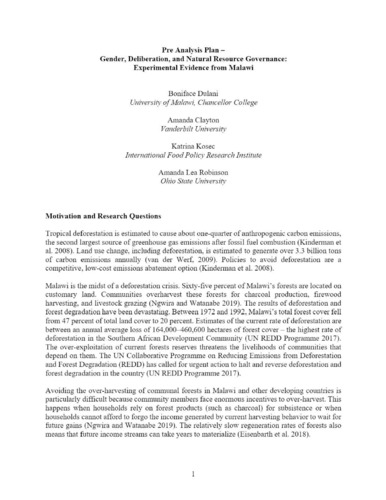Gender, Deliberation, and Natural Resource Governance: Experimental Evidence from Malawi
Abstract
Tropical deforestation is estimated to cause about one-quarter of anthropogenic carbon emissions, the second largest source of greenhouse gas emissions after fossil fuel combustion. Deforestation is also catastrophic for the communities that depend on tree harvesting for the livelihoods and who suffer the consequences of natural disasters linked to deforestation (e.g., mudslides). Avoiding the over-harvesting of communal forests in Malawi and other developing countries is particularly difficult because community members face enormous incentives to over-harvest. As a result, between 1972 and 1992, Malawi’s total forest cover fell from 47 percent of total land cover to 20 percent. Our research asks whether and how including women in deliberative bodies around communal forest governance affects participatory forest management practices. This question is of particular relevance in Malawi, where women are formally required to occupy either half or one-third of the positions on Malawi’s key land administration institutions, including land tribunals and customary land committees – but these requirements are often loosely enforced if at all. Women also face many informal barriers to accessing information and fully participating in decision making due to gender and family norms, despite the fact that – as the primary gatherers and users of natural resources – their participation is crucial for change in resource utilization. Our research thus has implications relevant to key stakeholders in Malawi’s local authorities who have the ability to more strictly enforce existing quotas.

